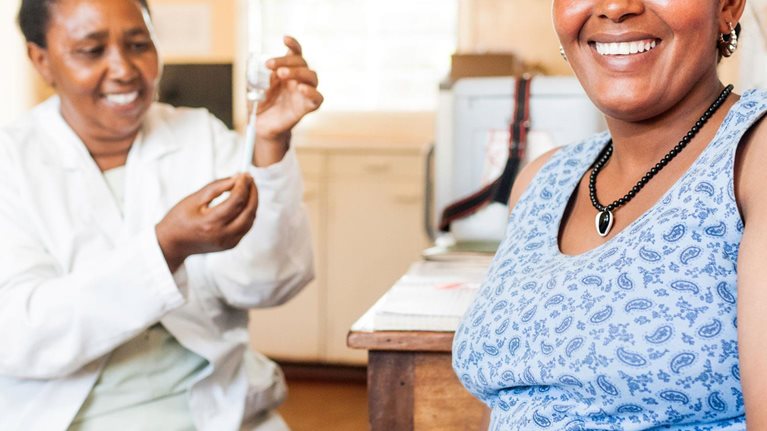Vaccines eradicated smallpox in the 1970s and reduced the number of deaths from measles by nearly 40 percent from 1999 to 2003. Yet many vaccines are implemented slowly, particularly in developing countries, and nearly 11 million children die every year due to a lack of vaccinations. McKinsey research suggests that network analysis, which companies use to improve business outcomes by analyzing information flows and personal relationships, could speed their adoption. Specifically, these techniques can shed light on the complicated processes and interactions that underpin (and often slow down) the introduction of vaccines.
The process of introducing vaccines varies from country to country and involves the influence of many stakeholders—ministries of health and finance, international agencies such as the United Nations Children’s Fund (UNICEF) and the World Health Organization (WHO), nongovernmental organizations (NGOs), community leaders, experts on disease, and funders, to name just some of the players. Defining roles, decision rights, and data requirements for this constellation of participants is difficult. The resulting confusion slows decision making and compounds chronic problems, such as poor infrastructure and limited public-health budgets. Delays, sometimes as long as 15 to 20 years, between the introduction of a vaccine in developed countries and its adoption in developing ones are the result.
To understand the decision-making processes involved, we analyzed recent or ongoing vaccine introductions in Egypt, Mauritania, Mexico, and Zambia. These countries gave us a well-rounded picture because they vary substantially by population size, per capita income, per capita healthcare expenditures, and disease burden—a health problem’s impact in a geographical area (for example, mortality, morbidity, and financial costs). In each country, we interviewed up to 30 decision makers and stakeholders, including health ministry officials and key NGO representatives. We also used confidential surveys to collect data on how frequently participants exchanged information, with whom they exchanged it, the value they ascribed to those interactions, and the types of information they exchanged. Finally, we asked participants about the role of documents (such as WHO’s vaccine introduction guidelines) and of national and international meetings on vaccines in their decision making.
Would you like to learn more about our Social Sector Practice?
The survey findings allowed us to construct network maps—illustrations that identify relationships and knowledge flows among individuals and groups. We hoped that the maps would show us how national and international roles are connected and which roles are central and valuable. In this way, the maps might help stakeholders understand how to improve decision-making processes and thus hasten the introduction of vaccines.
Our analysis showed that decision makers in Egypt, Mauritania, and Zambia didn’t actively engage global experts on the specific diseases these countries were targeting. The experts who participated in the decision to introduce the hepatitis B vaccine in Mauritania, for example, were all local medical and research specialists, primarily in its National Central Hospital. By contrast, stakeholders in the fourth country—Mexico—reported that international disease experts gave them a better understanding of the potential impact of the rotavirus vaccine on its population. Respondents in Mexico also indicated that these experts’ international stature helped accelerate the decision to introduce the vaccine (Exhibit 1).

We found as well that in all four countries, finance representatives either had no role in the process of deciding whether and when to introduce vaccines or were peripheral to it—and usually brought in near its end. When Zambia, for example, decided to introduce a new vaccine, representatives from the Ministry of Finance had relatively little contact with other decision makers (Exhibit 2). Given the importance of financing vaccine programs sustainably, especially in countries such as Egypt and Mexico, which renegotiate funding every year, these conclusions are troubling. Health ministries and other leading national stakeholders should look for ways to involve senior Finance Ministry colleagues earlier in the process and include them in regular meetings about potential vaccine programs.

Finally, our research showed that global institutions, such as WHO and UNICEF, play a pivotal role in decisions to introduce vaccines; all respondents, for example, said that WHO guidelines are important. We found, however, that surprisingly few stakeholders mentioned cross-country gatherings, such as regional meetings of WHO’s Expanded Program on Immunization (EPI), as important inputs. This finding appears to reflect a broader failure to share information across countries—something we also observed in other aspects of our study. International organizations should therefore look for new ways to promote the sharing of best practices and relevant technical knowledge (such as disease burden data) among countries afflicted by similar maladies.

Eradicating polio in Nigeria
Ours was a small-scale research effort. But it not only highlights issues that if addressed could speed future vaccine introductions, it also shows the value of network analysis as a tool to explore their dynamics in developing economies.
Our study was guided by an advisory board with experts from the Bill & Melinda Gates Foundation, the Pneumococcal Vaccines Accelerated Development and Introduction Plan (PneumoADIP), the Johns Hopkins Bloomberg School of Public Health, and the Program for Appropriate Technology in Health (PATH).


